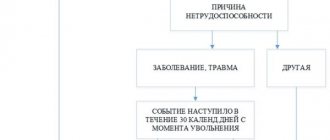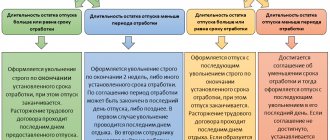What to do if the date of dismissal at the initiative of the employer and the date of opening the certificate of incapacity for work coincide? On the one hand, there are grounds to apply Part 6 of Art. 81 of the Labor Code of the Russian Federation, which contains a ban on the dismissal of an employee during the period of his temporary disability, and cancel the controversial order. On the other hand, at the time of dismissal, the employee did not say a word about the disease. Is it possible not to satisfy the employee’s request and leave everything as it is, or is it better to cancel the dismissal order and continue the employment relationship with him? The author considers two situations: when an employee “got sick” intentionally and when he received “sick leave” after completing all the documents.
Conflicts with employees must not only be resolved, but also prevented. Unfortunately, there are situations when this is quite difficult to do. For example, an employee opens a certificate of incapacity for work on the day of dismissal upon termination of an employment contract at the initiative of the employer. What to do? Should I pay benefits or is the employee considered to have resigned? What can be done to prevent such cases?
So, an unusual situation has arisen in your company. The employee is fired at the initiative of the employer under one of the paragraphs of Part 1 of Art. 81 of the Labor Code of the Russian Federation, for example, due to a reduction in staff or numbers, or for other reasons, say, under Art. 278 of the Labor Code of the Russian Federation (additional grounds for termination of an employment contract with the head of an organization). The procedure for terminating the contract was followed, the employee was familiarized with the dismissal order, he was given a work book with a record of dismissal, and payment was made. And the next day, or a week later, or, perhaps, already in court, the employee presents the employer with a sick leave certificate, opened precisely on the day of dismissal, with a demand to cancel the order of his dismissal.
The question arises, what to do in this situation? Should we satisfy the employee’s request and cancel the dismissal order, continuing the employment relationship with him, or leave everything as it is, waiting for the conflict to develop? Formally, the date of dismissal at the initiative of the employer and the date of opening the certificate of incapacity for work coincide. It would seem that there are grounds to apply Part 6 of Art. 81 of the Labor Code of the Russian Federation, which contains a ban on the dismissal of an employee during the period of his temporary disability, and cancel the controversial order.
But in judicial practice over the past few years, the concept of inadmissibility of abuse of rights by an employee has been formed. The Labor Code of the Russian Federation does not contain the concept of “abuse of rights by an employee.” However, it is disclosed in paragraph 27 of the resolution of the Plenum of the Supreme Court of the Russian Federation dated March 17, 2004 No. 2 “On the application by the courts of the Russian Federation of the Labor Code of the Russian Federation” (hereinafter referred to as the resolution of the Plenum of the Supreme Court of the Russian Federation No. 2): unfair actions of an employee to conceal temporary disability in day of dismissal.
Despite the fact that labor legislation does not establish an employee’s obligation to notify the employer about the opening of sick leave, deliberate concealment of this fact on the date of dismissal (if there is an opportunity to “disclose” it to the employer) is regarded by the courts as an abuse of the employee’s right.
Faced with such a situation, the employer needs to find out whether it was an abuse of right when the employee deliberately took sick leave, or whether he became incapacitated for reasons beyond his control. Let's take a closer look at them.
Situation one: the employee “got sick” intentionally
The employee, knowing about his upcoming dismissal “under the article,” prudently provided himself with sick leave on the day of the upcoming dismissal before completing the dismissal procedure. Let's say, just before the start of the working day, I visited a doctor and issued a certificate of incapacity for work, and while signing the dismissal order and receiving the work book, I already had a certificate of incapacity for work opened that day. In this case, there is dishonesty of the employee, i.e. the same “abuse of law” that the Plenum of the RF Armed Forces speaks about in Resolution No. 2.
The above example differs slightly from the substance of those cases that have been regularly considered by the courts since 2004. See, for example, the following judicial acts: rulings of the Moscow Regional Court dated January 12, 2012 in case No. 33-601/2012, 33-29485/2011, Moscow City Court dated June 3, 2011 in case No. 4g/6-4333, dated November 24 .2010 in case No. 4g/1-10400, St. Petersburg City Court dated September 23, 2010 No. 13190. The only difference is that in the listed judicial acts the employee has already had a certificate of incapacity for work for some time (sometimes quite a long time) at the time of dismissal. And in our case, the employee decided to provide himself with “sick leave” only on the day of dismissal. But both in the above judicial practice and in the situation we are considering, there will be dishonesty of the employee, abuse of his right not to be fired during the period of incapacity.
Thus, the cases considered by the courts and our example are characterized by the following signs of employee dishonesty:
- On the day of dismissal, the employee does not present a sick leave certificate or a copy thereof. Perhaps, for some reason, the employee does not have a sick leave certificate or a copy of it with him at the time of dismissal.
- The employee does not inform either orally, in writing, or in any other way to any of the persons conducting the dismissal procedure, or to his management, that he has an open sick leave at the time of dismissal.
Let us note that the regulations do not specify which representative of the employer should be informed about the presence of a certificate of incapacity for work. The court makes its conclusions based on specific circumstances.
Arbitrage practice
The cassation ruling of the Investigative Committee for civil cases of the Moscow City Court dated July 22, 2010 No. 33-22024/10 states that the plaintiff informed the personnel service employees and the secretary of the general director about her sick leave. The defendant tried to refute this argument by arguing that the employee did not report her “sick leave” to the general director personally. However, the court did not take this argument into account, considering the message about the certificate of incapacity for work to the personnel service and the director’s secretary as proper notification to the employer about his sick leave. Moreover, from the circumstances of the case, the court saw that the general director avoided communicating with the plaintiff. This conclusion of the court about the absence of abuse of rights on the part of the plaintiff seems logical and sufficiently justified.
It should also be noted that the employer may become aware of the employee’s opening of sick leave not only due to the actions of the employee himself. In this case, regardless of whether the employee reported his temporary disability or this became known in some other way, it can no longer be said that the employer was unaware of the sick leave.
Arbitrage practice
This situation is illustrated by the ruling of the Leningrad Regional Court dated March 30, 2011 No. 33-1566/2011. In the case, we are talking about the fact that the plaintiff’s immediate supervisor reported her disability in a memo addressed to the general director of the enterprise. Thus, evidence of the employer’s awareness of the plaintiff’s open sick leave is the mention of it in this document. The trial court denied the plaintiff's claims because there was no evidence that she had self-reported her illness. However, the Leningrad Regional Court took into account the employer’s awareness of this. In this case, the court did not find any abuse of rights on the part of the employee.
Another decision examined an interesting situation when on the day of dismissal the plaintiff was incapacitated for work, but neither the employee nor the employer knew about the issue of sick leave.
Arbitrage practice
The plaintiff was fired on December 22, 2008, but a certificate of incapacity for work was issued to her the next day after her dismissal, December 23, 2008, but from December 20, 2008, due to the fact that on December 19, 2008 at 8 p.m. 20 minutes. she went to the emergency room for medical help. The court noted that on the day of dismissal, neither the plaintiff nor the employer knew about the employee’s temporary disability, and therefore did not accept the plaintiff’s argument about dismissal during illness. However, it should be noted that the court does not mention the abuse of rights on the part of the plaintiff (decision of the Zheleznodorozhny District Court of Ulyanovsk dated March 23, 2009)1.
- The employee submits a “sick leave” after the employment relationship with him is terminated, or he “publishes” it only in court, while insisting on the illegality of his dismissal during the period of incapacity. If these circumstances exist, the employee’s actions can be considered an abuse of right. In such situations (if the employee makes a demand directly to the employer or in court to reinstate him at work, as well as related demands (for payment of forced absence, compensation for moral damage, etc.) and there are no violations in the dismissal procedure), the employer has every right to refuse the employee satisfying his requirements. When considering a case in court, taking into account the current practice, the truth will be on the side of the employer, who should not suffer due to the negative consequences of the employee’s dishonesty. However, it should be taken into account that it is the employer who will have to prove the dishonesty of the employee’s actions and the fact that he abused his right not to be fired during sick leave (clause 23 of Resolution of the Plenum of the RF Armed Forces No. 2).
Arbitrage practiceAs noted in the ruling of the Saratov Regional Court dated September 25, 2008 No. 33-3558, the dismissal of an employee during a period of incapacity for work is an independent basis for his reinstatement, regardless of the reasons that served as the basis for dismissal at the initiative of the employer. Therefore, you need to be especially careful when proving the fact of abuse of rights by an employee.
Thus, it is necessary to collect and evaluate the evidence base in advance on the circumstances listed above, which will confirm the dishonesty of the employee’s actions. When refusing to satisfy the employee’s demands to cancel the dismissal order, you must be sure that you will be able to prove the employee’s dishonesty if he goes to court and/or the labor inspectorate.
Can an employee be fired while he is on sick leave?
The Labor Code prohibits employers from firing employees while they are incapacitated . This is expressly enshrined in Art. 81 Labor Code of the Russian Federation. In this case, dismissal is, in principle, possible only on certain grounds listed in this article:
- insufficient qualifications of the employee;
- systematic failure to fulfill labor duties without significant reasons;
- disclosure of secrets protected by law, etc.
Frequent sick days are not listed in this series (can they be fired for frequent sick days?).
The ban on dismissal during illness does not apply if the employee wants to leave work himself. That is, it is possible to terminate the employment relationship with a sick employee only with his consent . That is, the basis must be a statement of resignation of one’s own free will or a written agreement of the parties. The same applies to those who have a sick child.
If the employer initiated the termination of the relationship, and the employee brought sick leave, opened by the date of dismissal, then there is no such basis for restoring the employment relationship.
But the date of dismissal must be moved to the first day after sick leave. If a notice of dismissal has already been entered into the employment record, it will need to be corrected.
Situation two: sick leave is received after all documents have been completed
Let's consider a more complex and interesting situation: an employee, having gone through the dismissal procedure, received a work book, leaves his place of work. And either immediately or at the end of the working day, he goes to a medical institution and opens a sick leave sheet on the same day. Accordingly, he subsequently informs the employer of his certificate of incapacity for work with a request to cancel the order of dismissal during the period of incapacity for work. In this situation, it is more difficult to talk about the employee’s dishonesty. Some may actually need medical attention due to the stress of being laid off by their employer.
Arbitrage practice
The ruling of the St. Petersburg City Court dated August 11, 2011 No. 33-12339 considered a situation where an employee tried to challenge the dismissal due to the fact that in the evening of the same day she was hospitalized due to deteriorating health. The court refused to satisfy the plaintiff’s demands, citing the fact that the “sick leave” was opened after the end of the working day, during the dismissal procedure she was able to work, and there were no violations in the dismissal procedure itself. The court regarded the plaintiff's application to dismiss her during the period of incapacity as an abuse of right on the part of the employee.
The Kemerovo Regional Court came to the opposite conclusion.
Arbitrage practice
In paragraph 3 of the certificate of the Kemerovo Regional Court dated March 15, 2007 No. 01-19/150 on the practice of consideration by the regional courts of civil cases in 2006, based on cassation and supervisory data, a case is analyzed when an employee was given a dismissal order at 16.30, the working day ended at 17.00, and at 17.55 the employee applied for sick leave. The district court satisfied the plaintiff’s demands, citing only the fact that the employee was fired during a period of incapacity. But the Kemerovo Regional Court overturned the district court’s decision, noting that the court should have examined the circumstances of issuing the certificate of incapacity for work and established whether the employer was aware of the plaintiff’s incapacity for work at the time of dismissal.
What if an employee, for example, is fired in the middle of the day and released from the workplace after all formal procedures have been followed? This is often what happens in companies. Therefore, the employee manages to receive sick leave before the official end of the working day. In our opinion, in this situation it is also not worth canceling the order and reinstating the employee at work, since the dismissal procedure had already been completed by the time the sick leave was issued.
Also in this situation, it is appropriate to say that the moment of termination of the employment relationship in this case is the moment the employee is given the dismissal order and work book, and not the moment the working day ends. From now on, the employer has no obligation to maintain the employee’s position during the period of incapacity. And the employee, accordingly, has no guarantee of maintaining his job during the period of incapacity.
Sick leave pay on the day of dismissal
To avoid conflict between the parties, when issuing an order, the employer must take into account all the nuances, including the time of sick leave and the reason for the employee’s disability. Otherwise, court intervention will be required to resolve the problem. If the clarification of relations between management and the employee does come to this, then the court, as a rule, takes the side of the employee, protecting his rights.
However, practice shows that the increasing legal literacy of the population contributes to the fact that employers often have to defend their interests in court. An employee who has prepared in advance can do everything to get more from the enterprise when leaving his previous place of work.
Recommendations
What can an employer do to protect itself as much as possible in the event of such “surprises” on the part of a dismissed employee? We propose the following measures:
- on the day of termination of the employment contract, the dismissal procedure must be recorded time by time. That is, the employee must indicate the exact time of familiarization with the dismissal order, the time of receiving it in hand, the time of receiving the work book, and the payment (if it is issued at the cash desk). If an employee refuses to sign the documents or does not set the date and time, the fact of delivery of the documents and the time of their delivery should be recorded in a commission act;
- The dismissal procedure must be carried out in the presence of witnesses, even if the employee does not refuse to receive documents and indicate the time of their receipt. Witnesses will subsequently be able to confirm the time of delivery of the dismissal documents to the employee, and the fact that during the dismissal procedure he did not present a certificate of incapacity for work, did not report his “sick leave”, and did not show critical signs of poor health;
- after the employee presents a sick leave certificate, it is necessary to make a request to the medical institution that issued it. The request must require information about the time the employee was seen by the doctor and the time when sick leave was issued. If the case goes to court, you can petition to call as a witness the doctor who opened the certificate of incapacity for work;
- Labor legislation does not establish a direct obligation for an employee to notify the employer about the opening of sick leave. However, from an analysis of the norms of the Labor Code of the Russian Federation, it follows that compliance with employee guarantees during a period of temporary incapacity (payment of sick leave, preservation of a job) depends on whether the employer is aware of the “sick leave”. Accordingly, a more “general” preventive measure would be to include in local regulations (for example, Internal Labor Regulations) and in job descriptions of employees the obligation to notify the employer about open sick leave directly on the opening day. This obligation will not contradict the norms of labor legislation, since it is aimed at maintaining labor discipline, because the employer must, among other things, draw up time sheets and record the employee’s sick days on them. And for the employee himself, this obligation is useful in that its fulfillment ensures the timely and complete provision of guarantees provided for by the Labor Code of the Russian Federation.
Irina Vishnepolskaya, legal expert at VimpelCom OJSC Source: United Editorial Board of Business Magazines
conclusions
The period of temporary disability is mandatory for officially employed persons. It is important that at the time of registration of sick leave the person is considered officially employed. Other factors do not influence the need for the employer to pay benefits.
From all of the above, it follows that the certificate of loss of ability to work issued on the day of dismissal is subject to payment in full. The amount of insurance payment is affected by the employee’s total length of service. Refusal to pay for a slip opened on the last working day is a violation of labor laws.
Can an employee resign on his own initiative during a period of incapacity?
Sometimes employees have a question about whether it is possible to write a letter of resignation while on sick leave. The law does not prohibit this. A typed or handwritten statement is required.
Some companies have special forms, so it is worth checking with management whether it is possible to provide an application filled out with your own hand in free form. Thus, it is possible to submit an application for dismissal at any time.
The law allows you to inform the employer of your intention:
- by phone;
- via email;
- via fax;
- other methods that allow you to transmit information.
The two-week countdown begins from the moment the information is transmitted; the application itself in paper form can be submitted after recovery. The resignation letter is submitted via courier or by mail when the HR department is located in another city. At the same time, it is possible to receive a work book by mail in person or ask an authorized person about it.
Due to the territorial problem, it is impossible to immediately sign the document, so the HR department employee first makes all the notes, puts a stamp and signature, sends it to the recipient, after which he needs to sign. In the absence of a signature, Pension Fund employees will not be able to count the length of service for calculating pensions.
If the illness is protracted, then it is worth issuing a power of attorney to a third party. They will have to submit an application and receive a work book. It makes a note that the signature was put by another person on the basis of a notarized power of attorney.
Grounds for dismissal and payment details
Sick leave after dismissal is paid on the above conditions, regardless of the reason: at the request of the employee, by agreement of the parties, due to layoff. Some nuances should be paid attention to.
A dismissed person can contact the employment service and receive sick leave benefits there, but its amount is not determined by calculation. It is equal to the unemployment benefit assigned to a citizen (Federal Law No. 1032-1 of 04/19/91, Article 28-1). Currently, such payments vary from 1,500 to 8,000 rubles.
If an employee is not just laid off, but the company is liquidated, his sick leave is paid from the Social Insurance Fund. A special case is a dismissed employee on labor and employment leave. Let us remind you that it is impossible to fire a pregnant woman without her consent. Sick leave after dismissal will be paid to her if 2 conditions are met:
- the vacation occurred within 30 days after the woman quit;
- the reasons for dismissal were recognized as valid.
Valid reasons include (according to the text of the order of the Ministry of Social Development No. 1012n dated 12/23/09, paragraph 14):
- transfer of a spouse to work in another region;
- a woman moving to live with him permanently;
- moving to another region for health reasons;
- the need to care for sick family members, disabled relatives of group I.
To avoid problems when contacting a former employer, each reason must be documented. Evidence may include certificates from the spouse’s place of work, certificates from medical institutions and extracts from the medical history, and other similar documents.
Sanctions for violations
Liability for violations is established by the Code of Administrative Offences. An employee can seek protection of his rights from labor inspectors, the prosecutor's office and the court.
If the court confirms that there were violations, the employee will be reinstated, and the company will compensate for lost earnings.
Social guarantees are provided by the Labor Code of the Russian Federation. A person can exercise their right to rest and submit a resignation letter at the same time. The rule also applies to cases when a woman takes sick leave to care for a child. In any case, the contract is terminated on the date specified in the application.
Social guarantees do not depend on the reason for registering a ballot. A person can be fired both during his illness and while caring for a sick family member.






